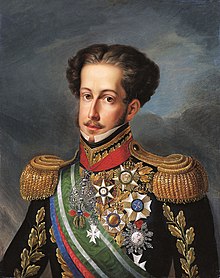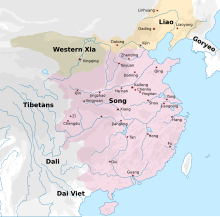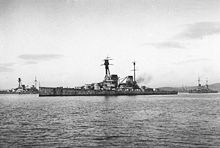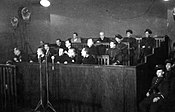Portal:History
The History Portal
History (derived from Ancient Greek ἱστορία (historía) 'inquiry; knowledge acquired by investigation') is the systematic study and documentation of the human past. History is an academic discipline which uses a narrative to describe, examine, question, and analyze past events, and investigate their patterns of cause and effect. Historians debate which narrative best explains an event, as well as the significance of different causes and effects. Historians debate the nature of history as an end in itself, and its usefulness in giving perspective on the problems of the present.
The period of events before the invention of writing systems is considered prehistory. "History" is an umbrella term comprising past events as well as the memory, discovery, collection, organization, presentation, and interpretation of these events. Historians seek knowledge of the past using historical sources such as written documents, oral accounts or traditional oral histories, art and material artifacts, and ecological markers.
Stories common to a particular culture, but not supported by external sources (such as the tales surrounding King Arthur), are usually classified as cultural heritage or legends. History differs from myth in that it is supported by verifiable evidence. However, ancient cultural influences have helped create variant interpretations of the nature of history, which have evolved over the centuries and continue to change today. The modern study of history is wide-ranging, and includes the study of specific regions and certain topical or thematic elements of historical investigation. History is taught as a part of primary and secondary education, and the academic study of history is a major discipline in universities.
Herodotus, a 5th-century BCE Greek historian, is often considered the "father of history", as one of the first historians in the Western tradition, though he has been criticized as the "father of lies". Along with his contemporary Thucydides, he helped form the foundations for the modern study of past events and societies. Their works continue to be read today, and the gap between the culture-focused Herodotus and the military-focused Thucydides remains a point of contention or approach in modern historical writing. In East Asia a state chronicle, the Spring and Autumn Annals, was reputed to date from as early as 722 BCE, though only 2nd-century BCE texts have survived. The title "father of history" has also been attributed, in their respective societies, to Sima Qian, Ibn Khaldun, and Kenneth Dike. (Full article...)
Featured picture
Did you know (auto generated)

- ... that West Auckland is home to the largest stratovolcano in the geologic history of New Zealand?
- ... that Art Rooney Jr. presided over what one Pro Football Hall of Fame selector described as "the best drafting run in NFL history"?
- ... that the Irish Bee Conservation Project is helping to rewild native bees with bee lodges on the estate of the historic Dunsany Castle?
- ... that Narita Viliamu Tahega has won 38 medals in international weightlifting competitions, the most in the history of Niue athletics?
- ... that visitors to Balmaclellan in Scotland can stay in a historic watermill that is "remarkable" for the preservation of its internal workings?
- ... that Yesenia Yarhui, the youngest parliamentarian in Bolivian history, was sworn into the Chamber of Deputies at just 19 years old?
Wail Mohammed al-Shehri (Arabic: وائل الشهري, romanized: Wāīl ash-Shehrī; or Alshehri; July 31, 1973 – September 11, 2001) was a Saudi school teacher and terrorist hijacker. He was one of five hijackers of American Airlines Flight 11, which was flown into the North Tower of the World Trade Center as part of the September 11 attacks.
Wail al-Shehri was an elementary school teacher from Khamis Mushait in the Asir region of Saudi Arabia. In early 2000, he traveled to Medina to seek treatment for mental problems. He and his younger brother Waleed traveled to Afghanistan in March 2000 and joined an Al-Qaeda training camp. The brothers were chosen, along with others from the same region of Saudi Arabia, to participate in the September 11 attacks. Once selected, al-Shehri returned to Saudi Arabia in October 2000 to obtain a clean passport, then returned to Afghanistan. In March 2001, he recorded his last will and testament on video. (Full article...)
On this day
- 1917 – World War I: Allied forces defeated Turkish troops in Beersheba in Southern Palestine at the Battle of Beersheba, with the battle involving one of the last successful cavalry charges.
- 1941 – 100 crew members of the USS Reuben James (pictured) perished when their vessel became the first U.S. Navy ship sunk by hostile action during World War II after it was torpedoed by the German submarine U-552.
- 1963 – A gas explosion at the Indiana State Fairgrounds Coliseum in Indianapolis killed 81 people and injured about 400 others.
- 1973 – Three Provisional Irish Republican Army members escaped from Mountjoy Prison in Dublin aboard a hijacked helicopter that landed in the prison's exercise yard.
- 2003 – After 22 years in power, Tun Mahathir Mohamad retired as Prime Minister of Malaysia.
- Cosimo III de' Medici (d. 1723)
- Muriel Duckworth (b. 1908)
- William Evans-Gordon (d. 1913)
- Gordon Steege (b. 1917)
Selected quote
What transforms this world is — knowledge. Do you see what I mean? Nothing else can change anything in this world.
— Yukio Mishima, Japanese author
Related portals
More Did you know...
- ... that the anti-religious campaign culminating in the Stalinist show trial of the Kraków Curia (pictured) led to the imprisonment of 123 Polish Roman Catholic priests in just one year?
- ... that Confederate brigadier general Alfred E. Jackson was pardoned by President Andrew Johnson because of his kindness toward Johnson's family during the Civil War?
- ... that after HMS Porcupine was nearly split in two by a torpedo, the halves were nicknamed HMS Pork and HMS Pine?
- ... that the Experiment was a boat powered by horses running on a treadmill and propelled by a then-novel type of screw propeller?
- ... that one of the highest-ranking generals in China was injured in battle nine times?
- ... that in Mesopotamian mythology, the Apkallu were sent by the god Enki, from Dilmun to teach human beings various aspects of civilization?
- ... that Karl Marx's theory of historical trajectory attempted to prove the long-term unsustainability of capitalism?
- ... that in November 1921, the schooner Cymric collided with a tram in Dublin?
Topics
Categories

History • By period • By region • By topic • By ethnic group • Historiography • Archaeology • Books • Maps • Images • Magazines • Organizations • Fictional • Museums • Pseudohistory • Stubs • Timelines • Chronology • People • Wikipedia historians
WikiProjects
![]() WikiProject History •
Ancient Near East • Australian History • Classical Greece and Rome • Dacia • Former countries • History of Canada • Chinese history • European history • Heraldry and vexillology • Indian history • Jewish history • Medieval Scotland • Mesoamerica • Military history • Middle Ages • History of Science
WikiProject History •
Ancient Near East • Australian History • Classical Greece and Rome • Dacia • Former countries • History of Canada • Chinese history • European history • Heraldry and vexillology • Indian history • Jewish history • Medieval Scotland • Mesoamerica • Military history • Middle Ages • History of Science
WikiProject Time • Days of the Year • Years
WikiProject Biography • Composers • Political figures • Saints • United States Presidents
Things you can do
 |
Here are some tasks awaiting attention:
|
Associated Wikimedia
The following Wikimedia Foundation sister projects provide more on this subject:
-
Commons
Free media repository -
Wikibooks
Free textbooks and manuals -
Wikidata
Free knowledge base -
Wikinews
Free-content news -
Wikiquote
Collection of quotations -
Wikisource
Free-content library -
Wikiversity
Free learning tools -
Wiktionary
Dictionary and thesaurus






















































